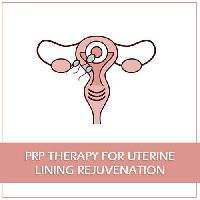
Uterine Rejuvenation Therapy
Recurrent implantation failure (RIF), a condition in which repetitive cycles of IVF are unsuccessful even though good quality embryos have been transferred, presents a significant clinical challenge to fertility clinics worldwide. We are currently using intrauterine infusion of autologous platelet-rich plasma (PRP) to improve embryo transfer outcomes among RIF patients. you may be eligible if you: Are between the ages of 18 and 45 and have a history of two or more unsuccessful embryo transfers.
...more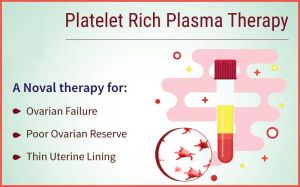
PRP Rejuvenation Therapy
Alternative of Donor eggs and surrogacy Autologous platelet-rich plasma, has been clinically validated and has been established as a treatment concept in a wide variety of medical disciplines . PRP is used in orthopedics and sports medicine to treat muscle and tendon injuries, and for the treatment of arthritis .PRP improves wound healing and reduces the development of infections. Moreover PRP has been used in dermatology and plastic surgery, for treatment of alopecia, actinic elastosis, and skin rejuvenation. Recently published clinical studies investigating effects of autologous platelet-rich plasma have shown to improve outcomes in IVF.
...more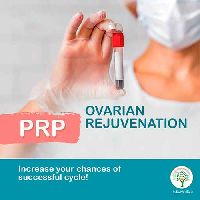
Ovarian Rejuvenation Therapy
Many women now a days try to become pregnant at older ages, but they have never considered the status of their quality of embryos. This means that the lower the quality of eggs they have, the bigger is the dilemma to use or not to use their own eggs in IVF technologies that they usually go in order to obtain successful pregnancies. New scientific attempts have gone through nowadays in order to regenerate their ovarian tissue with the help of autologous PRP therapy and so they can have more possibilities for a successful pregnancy even with poor ovarian reserves and Low AMH.
...more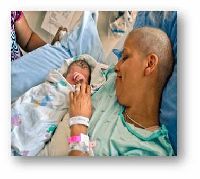
Onco Fertility
New hope for cancer patients what is oncofertility? oncofertility is a subfield that research to explore and expand options for the reproductive future of cancer survivors. Oncofertility bridges oncology and reproductive medicine that works to expand the fertility potential of young people with cancer. Oncofertility was developed to provide cancer patients with the option to take fertility preservation steps prior to and after cancer curing treatments have taken place. Fertility options for men established fertility preservation options for men include sperm banking, in which a semen sample is produced, frozen, and stored for future use, and testicular sperm extraction, during which sperm is retrieved directly from the testes through a short surgical procedure and frozen. Fertility options for women options for women to have children after cancer have increased significantly in recent years. Women should be counseled on established options such as embryo banking in which hormonal stimulation causes production of multiple eggs, which are removed, fertilized by sperm, and frozen for future use, and egg banking in which hormonal stimulation causes the production of multiple eggs, which are removed and frozen for storage and future use.
...more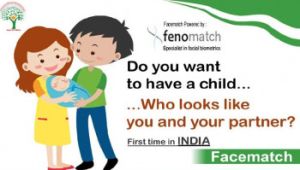
Fenomatch Treatment
Biometrics distances from facematch offers you the tool you wish. The decision to own a baby is one amongst the foremost necessary choices created in life. Finding the most effective egg or gamete donor to create that dream return true is simply as necessary. We would like to assist you, we would like to be a part of your marvellous life project. Finding an egg or sperm donor in which you see yourself reflected can take a lot of time and effort. Facematch allows you to find the donor you need, through its cutting-edge technology that allows the measurament of biometric distances of donors and compares them with you or your partner. We want to shed some light on your search! finding an egg or sperm donor within which you see yourself mirrored will take loads of your time and energy. Facematch permits you to seek out the donor you wish, through its stylish technology that enables the measurament of biometric distances of donors and compares them with you or your partner. We hope to bring the donor selection process as close as possible to you. We are committed to your family project. With facematch, you may forever have knowledgeable and comprehensive service, we know that you are going through a delicate, physical and emotional situation. At facematch we have a tendency to care regarding you and your family.
...more
IVF Services

Infertility And Dietetics
“your reproductive organs such as ovaries including the fat cells helps in regulating the estrogen, that tends to affect ovulation. If you are underweight, you may not be producing enough estrogen, and if you’re obese or overweight, you might be producing too much of it. ” good nutrition is a very important component of reproduction and pregnancy. Reproductive organs must be in a healthy state to begin and maintain a pregnancy to its full term. For more information on the right nutritional supplements kindly consult india ivf clinic which is the best fertility clinic in delhi. Dr richika is one of the expert infertility specialists who is one of the best infertility specialist doctors in gurgaon and delhi. She guides her patients and is very helpful in making them conceive the baby. The requirement for right nutrients remains at every stage of reproduction and one of the best sources of these nutrients is from food. Supplementation is necessary only these nutrients requirements are not met through food. According to various studies, your nutritional habits may have a very big impact on both male and female fertility. One should maintain the normal body weight, which is quite effective in the prevention of infertility occurring due to ovulatory disorders. Being underweight and, to a great extent, obesity, is highly related to the heightened risk of infertility. Insulin resistance can also impair ovulation in certain females. Right intake of monounsaturated fatty acids, obtained from vegetable fats, and avoiding the use of trans isomers of unsaturated fatty acids largely present in processed crisps, fast-foods cakes and sweets, powdered soups and hard margarine, may be effective in the opposition of infertility in females.
...more
Coping With Infertility
Infertility is one of the most agonizing and stressful experiences a woman or even a couple goes through. How you tend to cope with this emotionally draining situation very much depends on your personality and the situation you have faced as every person is different from other and every infertility problem is also distinct.somebody who has experienced pregnancy loss do have different necessities and plan to cope as compared with someone undergoing their first IVF treatment cycle or facing the agony of child loss. The best coping strategy for infertility is finding the strength within yourself and strengthening your relationship to get over this tough time. You must also seek help whenever needed and gaining as much as you can regarding your condition, availability of the infertility treatments, and the right resources,which are available to you. While medical science will take care of treating the physical causes of your infertility, you must simultaneously take care of your emotional wellbeing.
...more
Recurrent Miscarriage
Causes: pregnancy loss may be a result of several factors like genetic abnormalities, chromosomal defects other random events. The ovum, sperm, or the early embryo might also be accountable for these abnormalities. With an increasing maternal age, the risk of miscarriage also increases, which may occur because of poor egg quality resulting in chromosomal or genetic abnormalities. In certain cases, either of the parents may have mutations in their genes, however, the offspring could be more severely affected ultimately resulting in miscarriage. Any abnormality present in the uterus may also lead to miscarriage. The reasons may be poor blood supply or infection in the uterus. Some women have a congenitally abnormally shaped uterus or might develop abnormalities in their uterus over time. Hormonal imbalances that commonly occurs in diseases like thyroid and diabetes may also influence pregnancy loss. Anomalies in a mother’s blood clotting process are also one of the reasons for pregnancy loss. Environmental factors, occupational factors and stress do not seem to be related to pregnancy loss. Testing: Karyotype analysis of both parents: The karyotyping is the process, which is done to detect structural or numerical anomalies in the chromosomes in the parents. Regular evaluation of the uterus and the uterine cavity with advanced methods like ultrasound, saline ultrasound, hysteroscopy (to look inside the uterus), hysterosalpingogram X-ray, MRI. Treatment: People having chromosomal aberration are often referred for genetic counselling. In case of a uterine abnormality, surgery is advised depending on the defect. If antiphospholipid syndrome has been diagnosed, that medications that are known to reduce blood pressure are usually given.
...more
Third Party Reproduction
Donor sperm when the husband/partner lack any sperm or have a very poor semen analysis (azoospermia, oligospermia, poor motility), couples go for donor sperm (di). Sperm donation is also an option when there is a genetic problem which is inherited. Single women who want a child biologically also go for di. You should be psychologically ready to go for di. It is highly recommended that any patient who is seriously considering di should see a counsellor who is experienced giving the right counselling infertility, and about trying di. It is necessary that both partners should be comfortable to openly discuss the fears and questions. For many, it might mean dealing with certain questions of moral and ethical importance. For others it may be searching for questions about donor selection and whether to let the child conceived to know how they were conceived. Donor selection donor selection includes information relating to a donor’s physical characteristics, which may be educational qualifications, career history, race, ethnic background, and overall health. Many banks give written profiles about the donors and some sperm banks are even provides non-identifiable knowledge about the donor (including photographs) as well as gives a service for adult offspring to get the information about the donor. Everyone who is a donor must go for certain tests for infections such as gonorrhoea, chlamydia, streptococcal species, syphilis, hepatitis b, cytomegalovirus (cmv), and trichomonas. All these infections can easily spread via semen to a woman. Some of these infections have a great effect on the fetus; while others affect the woman greatly. The donor’s semen needs to be checked for the appearance of white blood cells which can symbolise an underlying infection within the reproductive tract.
...more
fertility preservation
If fertility preservation is in your mind then you need to organise a meeting with us. This initial appointment helps you in discussing your personal details, get informed about your fertility risks, and get to know about various fertility-protecting and fertility-preserving options for you. It also helps in building a contact with your fertility specialist. After undergoing a fertility-compromising treatment such as cancer you should get your fertility and hormonal issues assessed and controlled. You can also consider other future options like donor sperm or donor eggs. We involve in taking a medical history, arranging any important studies that include blood tests ultrasound evaluation of the ovaries and providing a counselling referral.
...more
Embryo Biopsy
Embryo biopsy ( also called Blastomere biopsy) is a process that is conducted at the time of IVF when an embryo has crossed 6 to 8 cell stages( Nearly 3 Days of embryo culture). Blastomeres or One or two cells are divided from leftover embryo and detached from zona pellucid that is a shell neighboring the development process of embryo. After elimination of cells, the growing embryo is put back inside the culture media and retrieved to the incubator where it can restart its usual development and expansion preimplantation genetic diagnosis – PGD can be conducted independently on the removed cell(s). At the initial phase of embryo growth, every cells out to be equal and thus elimination of cell through embryo at this phase should not eliminate anything complicated for usual growth. An embryo ought to competent enough to substitute the removed cell and should carry on separate subsequent blastomere biopsy. However a latest research recommended that a biopsy conducted at the blastomere phase was liable for a reduce chance that embryo ability of implantation inside the uterus afterward. Understanding 3 day, blastomere embryo biopsy Though normally, embryo biopsies were conducted on the day day 3 ( at multi-call phase), It is also conducts embryo biopsy on Days 5, 6, or 7 embryo development at the blastocyst stage. In the Blastocysts embryo there are minimum 128 cells and at the time of biopsy treatment, only a single cell(blastomere) is eliminated and then transferred to the genetics lab for inspection. Post the genetic lab conducts evaluation, they will submit us a report for every embryo in order to identify which embryos are normal( that has normal count of chromosomes or not affected by hereditary metamorphosis) and which are abnormal. After that we can able to transfer a single normal embryo and give great chance of having a healthy baby to the patient. With a day 3 biopsy,
...more
PGS Test
What Is PGS Or Pre-implantation Genetic Screening? PGS Or Preimplantation Genetic Screening is utilized to identify the cells present in an embryo the number of the usual chromosome that is 45. When an embryo develops in the lab, it normally grows as a blastocyst embryo on day 5. A small number of embryo cells transported to the private lab that utilizes technology to calculate the chromosomes quantity within every cell. Embryos that have a normal number of chromosomes are called “euploid,” and the embryos which are in abnormal quantity are called “aneuploid.” The objective of PGS is to obstruct the transmission of an abnormal embryo inside the uterus. Who Should Consider PGS? In short, PGS examines the correct number of normal chromosomes in embryos or not. This screening is useful for many patients as it has improved pregnancy rates and eliminates the threat of miscarriage; however, this specifically prescribed for the following: If a patient has suffered multiple failures in IVF Cycle: PGS test improves the chances of fruitful embryo transfer by determining the right number of normal chromosomes. Eventually, it will increase the possibility of successful pregnancy and reduce the requirement of multiple IVF cycles. If miscarriages happened more than twice Ultimately when PGS is identifying the healthy chromosomes in the embryo, the chances of successful pregnancy naturally increases. As a result of that, it is also eliminating the possibility of miscarriages that usually happens because of abnormal chromosomes present in embryos. If your age is above 35 years In renowned research on the facts tells that ladies of above 35 years old have more possibility of infertility, miscarriages and downs syndrome. Eventually, as women exceed the age limit of 35, the more the chances of abnormal chromosomes presence in embryos, which leads to failed or no pregnancy
...more
Noninvasive Prenatal Testing
Noninvasive prenatal testing (NIPT) The term, Noninvasive prenatal testing (NIPT), often known as noninvasive prenatal screening (NIPS), is a process of characterizing the threat that a fetus will be born with a definite hereditary deformity. This inspection observes tiny parts of DNA that are wandering in a pregnant lady’s blood. Contrary to most DNA that is found into the cell’s nucleus, these particles are free circulating and but not inside the cell, so they are termed as called cell-free DNA (cfDNA). These tiny particles normally hold less than 200 DNA building blocks (base pairs) and occur when cells are broken down or die off. Thus their ingredients, including DNA, are circulated inside the bloodstream. NIPT checks for Patau syndrome (trisomy 13), Edwards syndrome (trisomy 18) Down syndrome, and (trisomy 21). And they can result in minor to major intelligence incapability and are related to the deep, inborn deformity. NIPT is more precise than a conventional first-trimester test, and there is a low chance of wrong positive and negative results. That eventually means that it will be a low chance your surgeon would suggest follow-up screening like amniocentesis. Who should get the NIPT prenatal test NIPT is generally recommended to women based on her OB-GYN advice and procedure.. However there some risk factors that compel your surgeon to recommend it strongly Paternal and maternal chromosomal abnormality Family or individual history of a pregnancy with a chromosomal abnormality The age of women is 35 and older during the delivery The decision to take NIPT screening is an individual’s personal decision, so you can take time and have a second opinion. It is up to you, what would be best for you. If you don’t know what to do, then you can have a word with our renowned surgeon and genetic counselor. He will help you in giving you the best advice as per your case scenario.
...more
Preimplantation Genetic Diagnosis
What do you mean by Preimplantation Genetic Diagnosis ? (PGD) or PGT-M/PGT-SR Preimplantation genetic diagnosis (PGD) is reproductive technique along with IVF process to enhance the possibility of conceiving a baby. PGD is hereditary inspection on cell extraction from embryo to choose the fertilized embryos for achieving pregnancy or to combat the genetic ailment that can hit the couples. Who is recommended to PGD? Preimplantation genetic diagnosis (PGD) might be recommended in all IVF cycles, however couples who are having irregular chromosomes or particular genetic disturbance can choose this test. This include women who have previous pregnancy with abnormal chromosomes and have had multiple miscarriages.. The age factor of women is deciding factor in chromosomes abnormalities. Women who are in the age of 38 and above have more chance generating embryos with higher number of chromosomes aberration. This test also has another name and that is PGT-M /PGT- SR. Moreover if couples obtain a formational postponement of chromosomes, PGD can detect which embryos have a normal quantity of chromosomes elements. This technique is also known as PGT-SR (structural rearrangement).. if there is 25 to 30 percent of possibility that a child can suffer with an explicit genetic ailment, PGD is crafted to detect which embryos is affected or unaffected or source( if applicable) fo that ailment. Then only healthy and disease free embryos inserted to the womb to achieve pregnancy. This is also called PGT-M (monogenic disorders).
...more
IVF Service
In Vitro Fertilisation refers to the Fertilization that occurs outside the human body.this method was invented initially for providing fertility solutions in females who suffer from blocked or dysfunctional fallopian tubes. currently, IVF is prescribed to patients who are unable to conceive due to other reasons as well.
...more
Early Fertility Treatment
How does Ovulation Induction work? Deriving blood samples for measuring the hormone levels at particular stages of the cycle, Taking out a transvaginal ultrasound to observe the development of ovarian follicles and determine the thickness and appearance of the lining of the womb. The Ovulation Induction cycle Day 1: on the first day of your menstrual cycle you need to Call the clinic to fix an appointment for a blood test. Day 2-4: initiate the treatment by starting the medication. Day 10 or 11: Again visit the clinic for a blood test to ascertain your hormone level or get an ultrasound. Day 14: on the 14th day of your menstrual cycle you need to visit the clinic for an ultrasound test. that will help you determine when you are going to ovulate.
...more
Fertility Workup
Testing facility of all sorts for fertility diagnosis are available with us that ranges from diagnostic ultrasound, reproductive hormones to determine the cause behind infertility. It is advisable that you must undergo these tests before we could rule out your final treatment/ plan for the management of infertility. Diagnostic Tests Males Regardless of what you do and and whether you are a -lawyer, politician, banker, pensioner, or cook,at our clinic,we will address to your problem, and cater to your needs, by guaranteeing you the specialist care and hospitality, that are constant values for our staff. A basic semen analysis is the main test arecommended to all males seeking treatment. If necessary we also go for sperm survival test and quality semen analysis. . Men who are undergoing more severe problems can also take up the DNA fragmentation test.. such as Testosterone , SHBG ,HIV, TSH , Prolactin, FSH,LH, HCV,HBSAG,VDRL are also recommended If required Ultrasound of the Scrotum and Testes is also recommended to completing the fertility evaluation. Diagnostic Tests Females Blood tests: These tests include a collection of blood tests that include complete blood count, Urine routine microscopy, RBS, VDRL, HIV, HBsAg, HCV, AMH.TSH, PROLACTIN, and certain other tests after determining the medical history of the couple. Transvaginal ultrasound: An elaborate ultrasound of the uterus and adnexa is also provided to figure out any anatomical disorder. Particular tests: In case a woman faces any repeated failure of implantation and recurrent loss of pregnancy various other tests are also recommended.
...moreBe first to Rate
Rate ThisOpening Hours